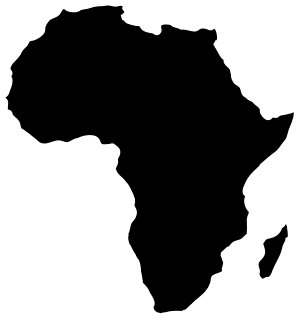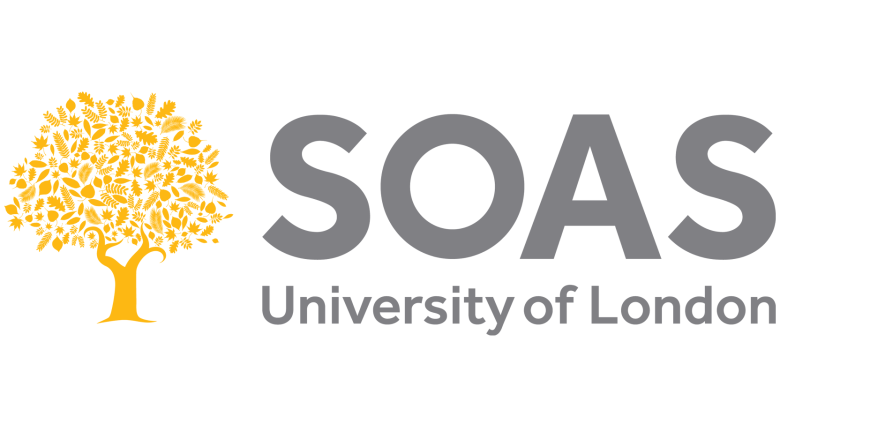African Arguments series
African Arguments is a series of short books about contemporary Africa and the critical issues and debates surrounding the continent. The books are scholarly and engaged, substantive and topical.
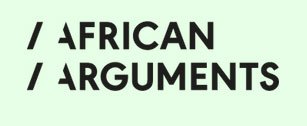 African Arguments
African Arguments
African Arguments is a series of books about contemporary Africa and the critical issues and debates surrounding the continent. The books are scholarly and engaged, substantive and topical. They focus on questions of justice, rights and citizenship; politics, protests and revolutions; the environment, land, oil and other resources; health and disease; economy: growth, aid, taxation, debt; and both Africa’s international relations and country case studies.
The series is published in paperback and ebook at first impression and all efforts are made to ensure affordability and distribution in the African continent whether through co-publishing, distribution or discounted orders. The editors welcome proposals for books of around 50-80,000 words.
Series editors
Adam Branch
Eyob Balcha Gebremariam
Rachel Ibreck
Nanjala Nyabola
Ebenezer Obadare
Portia Roelofs
Jon Schubert
Nicholas Westcott
Series sponsors
British Institute in Eastern Africa
Royal African Society
Managing Editor
Stephanie Kitchen
Publishing
 From 2021 this series is being published with Hurst, an independent non-fiction
publisher.
From 2021 this series is being published with Hurst, an independent non-fiction
publisher.
For enquiries, and to submit a proposal, contact Stephanie Kitchen, managing editor, sk111(at)soas.ac.uk.
Undoing a Revolution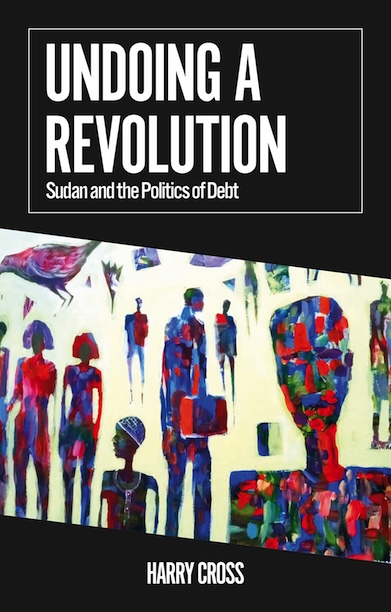
Harry Cross
In 2019, a people’s revolution ended the thirty-year reign of Sudan’s military president Umar al-Bashir. A transitional government took power, led by esteemed international economist Abdalla Hamdok and promising a return to civilian rule. But Sudan’s new government quickly imposed a shock therapy programme of cuts, privatisations and devaluation, following the diktat of foreign lenders. In 2021, as Sudan grew poorer, the army seized on popular discontent to launch a coup, burying hopes for a democratic transition. But why did Sudan’s first civilian government in more than a quarter-century bend to the will of creditors at this crucial moment in the country’s history? The answer lies in an unwieldy and unpayable debt burden that has long constricted Sudanese politics and society.
Undoing a Revolution narrates the history of sovereign debt in Sudan from independence to the present, revealing the innovative policies adopted by Sudanese governments to manage their place in the global economy. But it also shows how external actors have leveraged the power of debt to impose their will and wreak havoc. With Sudan embroiled in civil war since 2023, Harry Cross explores the political implications of sovereign debt for states and societies across Africa, and around the world.
Published for the International African Institute by Hurst Publishers
ISBN: 9781805263050, 216pp, April 2025
Weaving Political Time in Morocco: The Imaginary of the State in the Neoliberal Age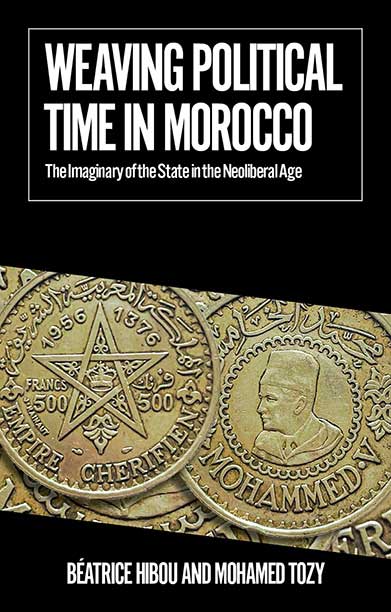
Béatrice Hibou and Mohamed Tozy
Translated by Katharine Throssell
Explores how neoliberal ideology and historic traditions of government come together in contemporary Morocco. Analyses of state power in Morocco have always been mired in exoticism or exceptionalism. The Kingdom is said to be a prototype of political immobility; a country caught in the authoritarian and conservative grip of its monarch, known as the ‘Commander of the Faithful’; a state in need of democratisation, but also a bastion of moderate Islam.
Published for the International African Institute by Hurst Publishers
ISBN: 9781805262794, 424pp, January 2025
Comrades Beyond the Cold War: North Korea and the Liberation of Southern Africa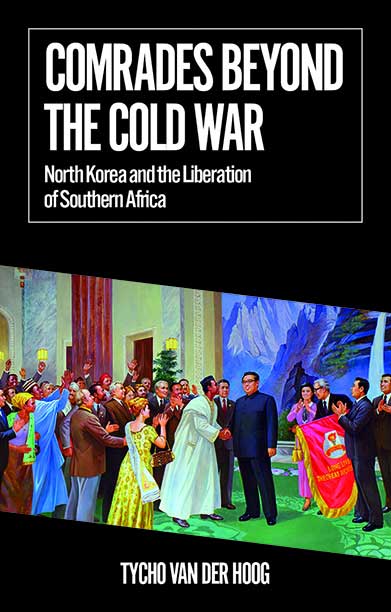
Tycho van der Hoog
A pioneering account of how African revolutionaries benefitted from North Korean aid in their struggles for independence–and how they repay this support today.
Departing from the focus on large-scale humanitarian and military interventions associated with ‘states of emergency’, Behrends highlights the forms of cooperation and mutual knowledge production that emerge on the ground in these lifeworlds in crisis. She combines meticulous ethnographic description with theoretically grounded arguments to offer a pioneering study of how individuals have anticipated, survived and adapted to recurring crises and war in one of the world’s most economically marginalised regions.
Published for the International African Institute by Hurst Publishers
ISBN: 9781805262787, 368pp, January 2025
Lifeworlds in Crisis: Making Refugees in the Chad–Sudan Borderlands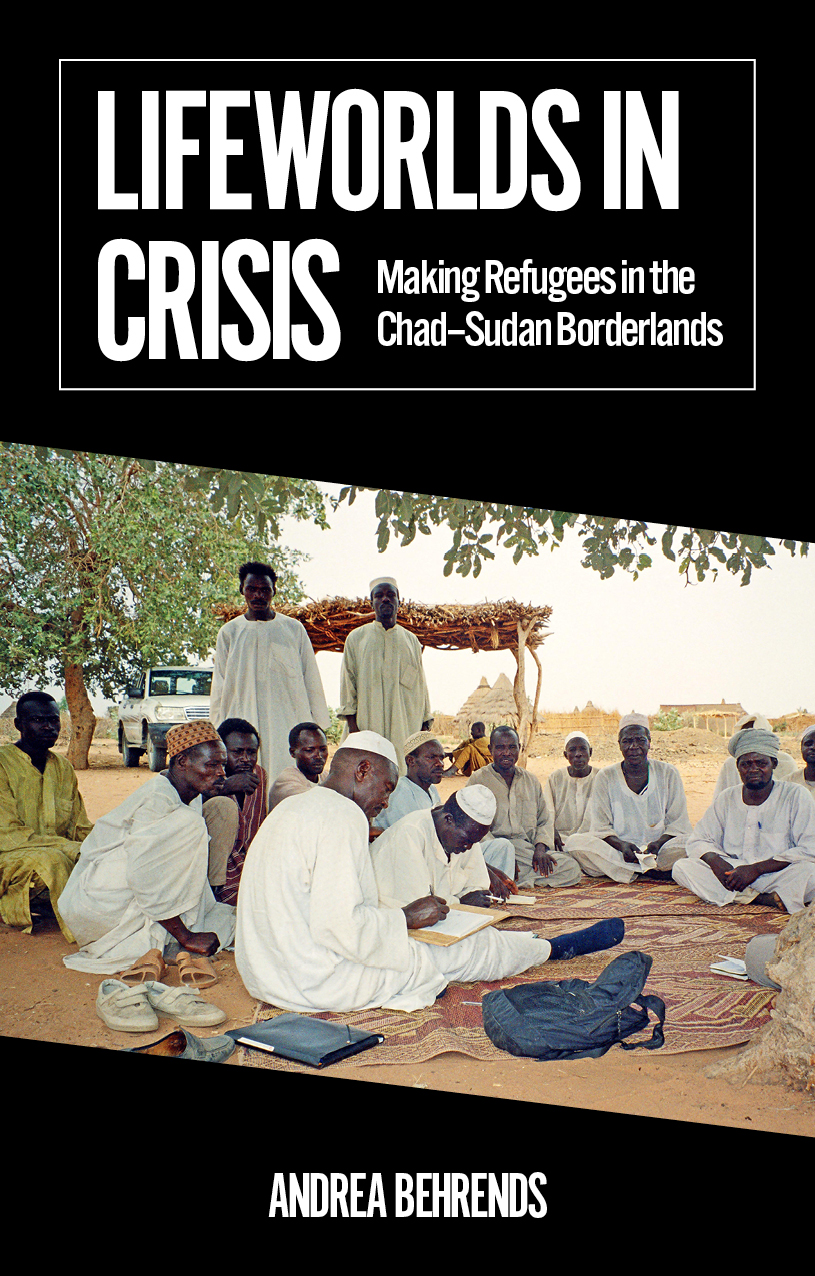
Andrea Behrends
The continuing Darfur War has caused mass displacement since 2003, with hundreds of thousands driven from their homes and many forced into refugee camps in western Sudan and neighbouring Chad. Building on twenty years of research in the region, Andrea Behrends tracks the repercussions of this conflict—sometimes referred to as the ‘first genocide of the twenty-first century’—for those living through it: those who stayed put, those who fled from rural areas to towns, those who moved to refugee camps, and those who fought. Telling the story of everyday survival on the Chad–Sudan border, an area central to state politics in the larger region, her account sheds light on how people create belonging, exchange knowledge, develop new practices and build futures in the face of extreme uncertainty.
Departing from the focus on large-scale humanitarian and military interventions associated with ‘states of emergency’, Behrends highlights the forms of cooperation and mutual knowledge production that emerge on the ground in these lifeworlds in crisis. She combines meticulous ethnographic description with theoretically grounded arguments to offer a pioneering study of how individuals have anticipated, survived and adapted to recurring crises and war in one of the world’s most economically marginalised regions.
Published for the International African Institute by Hurst Publishers
ISBN: 9781911723226, 392pp, January 2024
Africa’s Global Infrastructures: South–South Transformations in Practice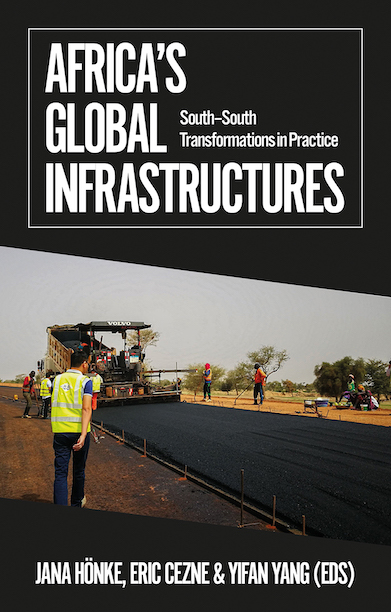
Jana Hönke, Eric Cezne and Yifan Yang
The boom in South–South relations since the early 2000s has seen a flurry of investment in African infrastructure from emerging markets across the Global South. While the extent to which these projects spur growth is constantly debated, few studies have addressed their impact on ground-level political and socio-economic practices in Africa—or their consequences for transnational governance more broadly.
Through the lens of infrastructure, this book investigates the developmental ideas, processes and techniques that have travelled to and emerged from Africa as a result of Global South–led projects. How have they been adapted, transformed and contested by local actors? How does this shape business–society relations? And how has this challenged the Western-dominated global order? The contributors zoom in on large-scale Chinese-, Brazilian- and Indian-funded ventures—dams, ports, roads and mines—across countries including Kenya, Mozambique and the DRC. These ‘frontier zones’, bringing together politicians and practitioners, campaign groups and communities from Africa and elsewhere, offer a unique insight into the global workings of our contemporary world.
Taking a bottom-up approach, Africa’s Global Infrastructures explores the longer-term significance and implications of these pluralistic socio-economic interactions, for the continent and beyond.
Published for the International African Institute by Hurst Publishers
ISBN: 9781805260226, 328pp, November 2023
Borderless Africa: A Sceptic's Guide to the Continental Free Trade Area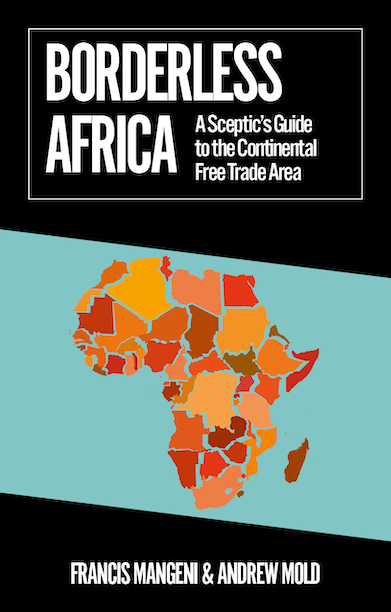
Francis Mangeni and Andrew Mold
The African Continental Free Trade Area, established in 2018, represented a monumental step forward for
Africa in terms of meeting longstanding aspirations for greater economic and political integration. But
it has nonetheless been met with scepticism in some quarters, both within the continent and beyond.
Borderless Africa makes the case for the AfCFTA in an accessible and compelling way, without shying away
from technical and academic debates. Francis Mangeni and Andrew Mold take us on a journey through the
different dimensions and implications of the AfCFTA, the largest free-trade zone in the world, starting
with its underlying economic rationale. Pointing to the numerous historical examples of successful
regional integration, they argue that the African continent will need to take on board such lessons as
the agreement is implemented. They discuss, too, the more controversial elements of the AfCFTA,
including the freedom of movement protocol, contending that this should not be seen as an optional
extra, but as an intrinsic part of the accord.
Also exploring the role of external partners in the construction of an economically stronger, more
united Africa, this fascinating study reveals how the AfCFTA is contributing to sustainable development
across the continent.
Published for the International African Institute by Hurst Publishers
ISBN: 9781787389441, 296pp, June 2023
Insurgent Nations
Rebel Rule in Angola and South Sudan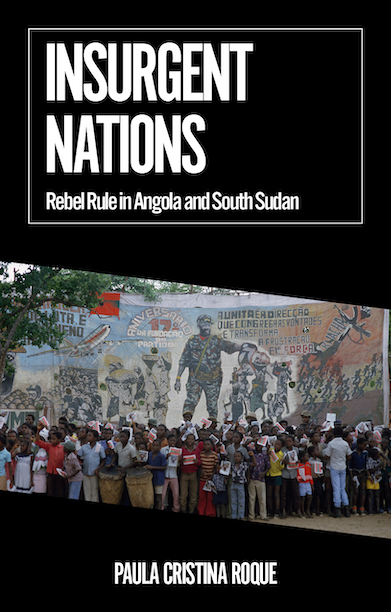
Paula Cristina Roque
Over two separate twelve-year periods, two opposing ‘states’ governed in parallel in Angola (1979–1991)
and Sudan (1990–2002), each with competing conceptions of society, history and national
identity. Deeply dividing communities with their counter-nationalist programmes, rebel parties UNITA in
Angola and the SPLM/A in Sudan, which had fought Africa’s longest and bloodiest civil wars,
built political and military enterprises in opposition to the established governments.
Insurgent Nations unpacks the complexities of these movements, exploring the charisma of their leaders,
the ruthlessness of their military operations, their political manoeuvrings, and their multiple
transformations in war and peace. Using first-hand, unpublished accounts from their leaders and cadres,
Paula Cristina Roque provides unique insight into UNITA and the SPLM/A’s governing strategies. She
details the ‘nations’, ‘states’ and ‘societies’ that were forged by the parties’ ideologies,
sub-nationalist concerns and interactions with the population. While UNITA’s political project in the
Free Lands of Angola was centrally controlled and totalitarian, the SPLM/A’s New Sudan was decentralised
and minimalist, built from the bottom up.
This is the first volume to compare the policies and perspectives of UNITA and the SPLM/A, offering a
new understanding of territory-governing insurgencies. Ultimately, both rebel states were exercises in
survival, resilience and adaptation.
Published for the International African Institute by Hurst Publishers
ISBN: 9781787389434, 408pp, July 2023
Bushmeat.
Culture, Economy and Conservation in Central Africa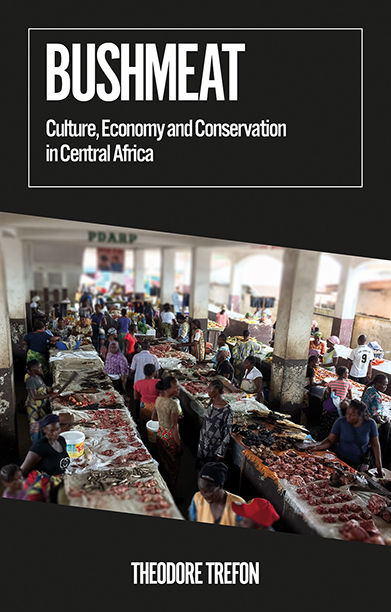
Theodore Trefon
A detailed investigation of the environmental, social and economic consequences of wild meat
consumption in the Congo Basin.
In much of Central Africa, eating wildlife is seen as a normal, desirable and common-sense practice.
Almost all wild animals, from the largest mammals to the smallest invertebrates, are hunted, traded and
consumed, providing vital income and nutrition for millions of people. But as demand for bushmeat grows,
animal populations are being decimated, directly impacting biodiversity, local economies and public
health. Taking an interdisciplinary approach, Bushmeat explores questions ranging from deforestation and
conservation strategies to infectious diseases, urban street food and law enforcement. It explains how
the popularity of wild meat consumption has spread from rural areas into major cities, fuelled by rapid
urbanisation, poorly defined regulations, and developing trade networks-whether small-scale and
informal, or commercial and politically connected. While unsustainable hunting practices pose clear
problems for wildlife conservation, they also increase the risk of rural food insecurity and of new
infectious diseases emerging-as HIV, Ebola and Covid-19 have shown. But cultural attachment to wild
meat, and its dietary importance for many communities, make the ‘bushmeat crisis’ difficult to solve.
Based on extensive interviews and a comprehensive review of secondary literature, Bushmeat presents a
startling account of one of the Anthropocene’s catastrophes in the making.
Published for the International African Institute by Hurst Publishers
ISBN: 9781787388147, 256 pp, October 2022 9781787388147
Trade Makes States: Governing the Greater Somali Economy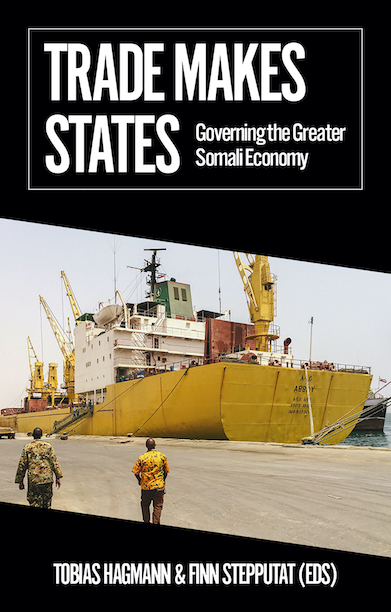
Tobias Hagmann, Finn Stepputat
A detailed investigation of the links between state-building and commodity exchange across the
Somali-inhabited territories of East Africa. Trade Makes States highlights how trade and the circulation
of goods are central to Somali societies, economies and politics. Drawing on multi-site research from
across East Africa’s Somali-inhabited economic space–which includes areas of Kenya, Djibouti, Uganda and
Ethiopia–this volume highlights the interconnection between trade and state-building after state
collapse. It scrutinises the ‘politics of circulation’ between competing public administrations, which
seek to generate revenue and to control infrastructures along major trade corridors. The contributors to
this volume draw attention to the ingenuities of transnational Somali markets, which often appear to be
self-governed. Their dynamism and everyday administration by a host of actors provide important insights
into contemporary state formation on the margins of global supply-chain capitalism.
Published for the International African Institute by Hurst Publishers
ISBN: 9781787387058, 312pp, June 2022
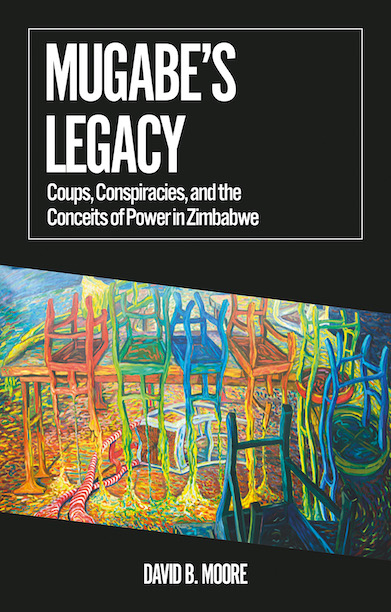 Mugabe’s Legacy: Coups, Conspiracies, and the Conceits of Power in
Zimbabwe
Mugabe’s Legacy: Coups, Conspiracies, and the Conceits of Power in
Zimbabwe
David B. Moore
Zimbabwe’s party-internal ‘coup’ of 2017, and deposed president Robert Mugabe’s death nearly two years
later, demand careful, historically nuanced explanation. How did Mugabe gain and retain power over party
and state for four decades? Did the suspected and nearly real ‘coups’, the conspiracies behind them, and
their concurrent mythomaniacal conceits ultimately, ironically, spell his near-tragic end? Has Mugabe’s
particular mode of power reached a finality with his own downfall, as his successors struggle more to
balance Zimbabwe’s political contradictions? Will the phalanxes arrayed against Mugabe’s control fray
further, as Zimbabwe fades?
Published for the International African Institute by Hurst Publishers
ISBN: 9781787387713, June 2022, 304pp
Against Decolonisation: Taking African Agency Seriously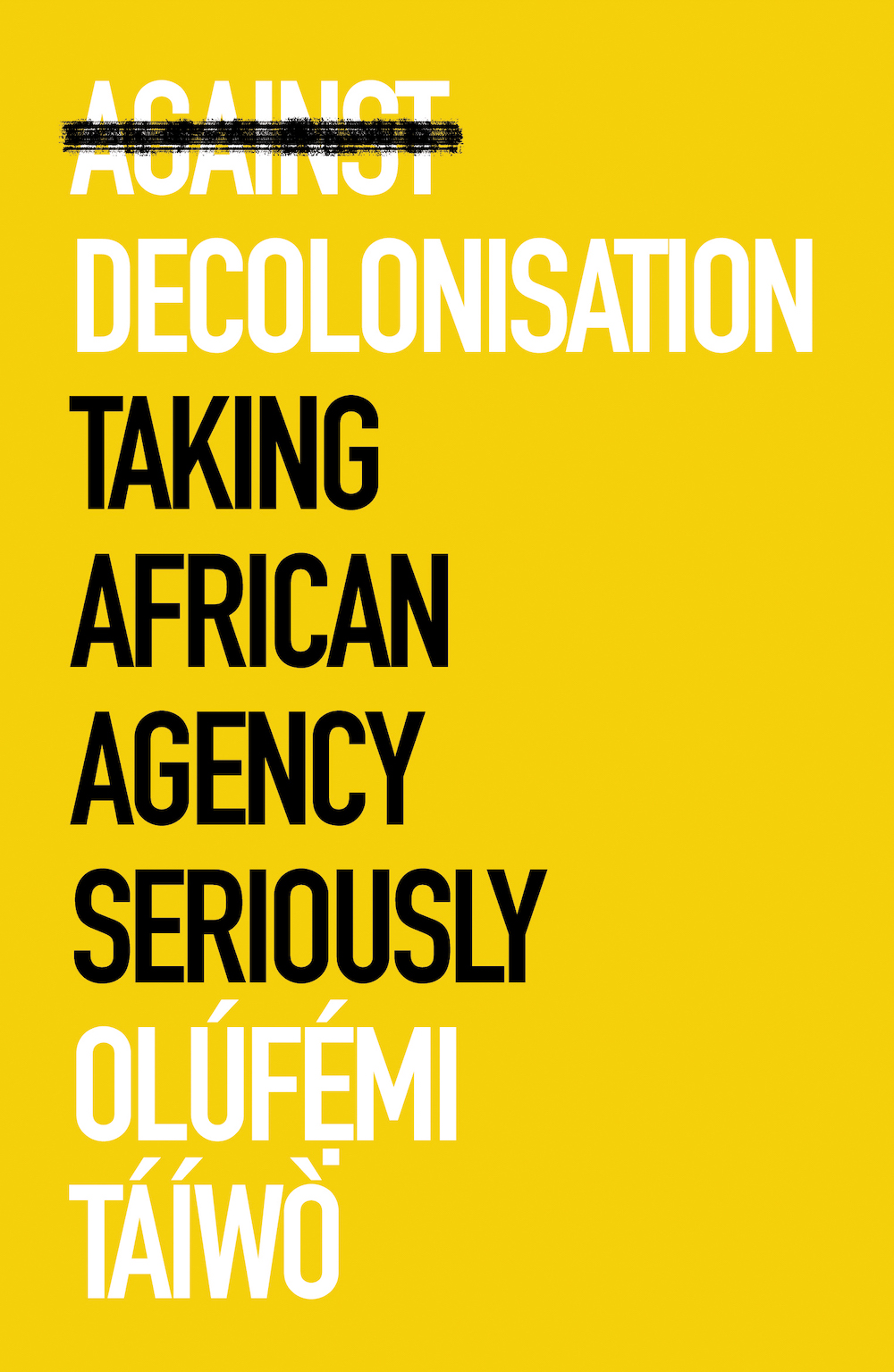
Olúfẹ́mi Táíwò
Decolonisation has lost its way. Originally conceived as a struggle to escape the West’s direct
political and economic control, it has become a catch-all idea, often used to perform contemporary
‘morality’ or ‘authenticity’. In the process, it suffocates African thought, and denies African agency.
Olúfẹ́mi Táíwò fiercely rejects the indiscriminate application of ‘decolonisation’ to everything from
literature, language and philosophy to sociology, psychology and medicine. He argues that the
decolonisation industry, obsessed with exposing slights and cataloguing wrongs, is seriously harming
scholarship on and in Africa. He finds decolonisation as applied to culture intellectually unsound and
wholly unrealistic, conflating modernity with coloniality, and groundlessly advocating an open-ended
undoing of global society’s foundations. Worst of all, today’s movement attacks its own proclaimed
cause: ‘decolonisers’ themselves are disregarding, infantilising and imposing values on contemporary
African thinkers.
Published for the International African Institute by Hurst Publishers
ISBN: 9781787386921, 368pp, June 2022
Conflict Minerals, Inc:
War, Profit and White Saviourism in Eastern Congo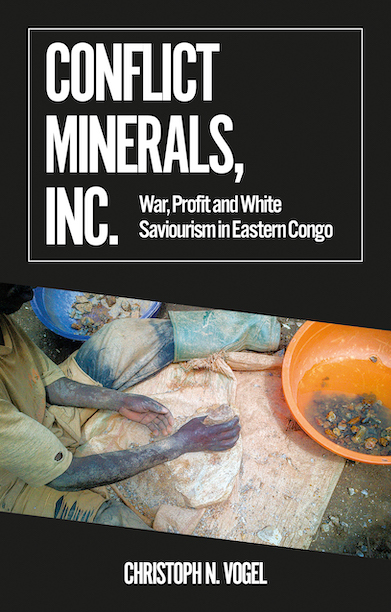
Christoph N. Vogel
Have international efforts to regulate resource extraction from war zones in the DRC done more harm than
good? In the twenty-first century, the relationship between violent conflict and natural resources has
become
a matter of intense public and academic debate. As a result of fervent activism and international
campaigning, the flagship case of ‘conflict minerals’ has captured global attention. This term groups
together the artisanal tin, tantalum (coltan), tungsten and gold originating from war zones in Central
Africa. ogel demonstrates how Western advocacy and policy have relied on colonial frames to drive
change, and how White Saviourism perpetuates structural violence and inequality across global supply and
value chains.
Published for the International African Institute by Hurst Publishers
ISBN: 9781787387065, 224pp, April 2022
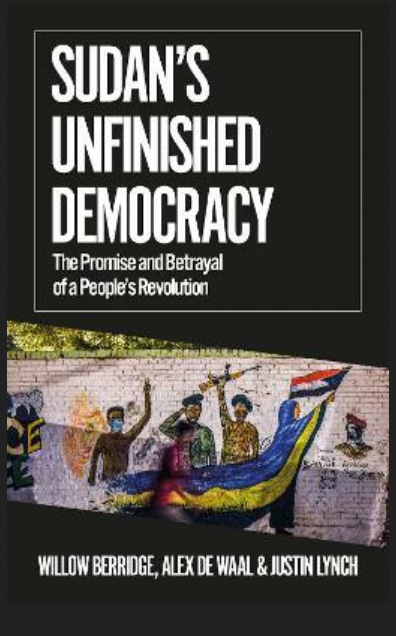 Sudan’s Unfinished Democracy: The Promise and Betrayal of a People's
Revolution
Sudan’s Unfinished Democracy: The Promise and Betrayal of a People's
Revolution
Alex de Waal, Willow Berridge, Justin Lynch
This book tells the story of the Sudanese revolution of 2019; of how it succeeded in bringing down the
long-standing rule of President Omar al-Bashir; and of the troubled transitional civilian-led government
that was installed in his place. It sets the scrupulously non-violent uprising in its historical
context, showing how the protesters drew upon the precedents of earlier civic revolutions and adapted
their practices to the challenges of the al-Bashir regime. The book also explores how that regime was
brought to its knees through its inability to manage the intersecting economic and political crises
caused by the secession of South Sudan and the loss of oil revenue, alongside the uncontrolled expansion
of a sprawling security apparatus
Published for the International African Institute by Hurst Publishers
ISBN: 9781787385351, 280pp, December 2021
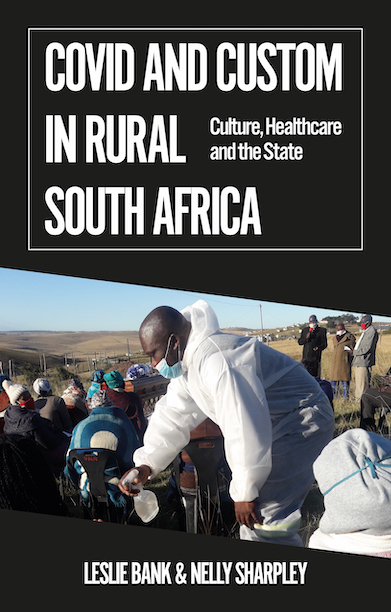 Covid and Custom in Rural South Africa
Covid and Custom in Rural South Africa
Leslie Bank,
Nelly Sharpley
This book explores the impact of Covid-19, and the associated state lockdown, on rural lives in a former
homeland in South Africa. The 2020 Disaster Management Act saw the state sweep through rural areas,
targeting funerals and other customary practices as potential ‘super-spreader’ events. This
unprecedented clampdown produced widespread disruption, fear and anxiety. The authors build on
path-breaking work concerning local responses to West Africa’s Ebola epidemic, and examine the HIV/AIDS
pandemic, to understand the impact of the Covid crisis on these communities, and on rural Africa more
broadly.
Published for the International African Institute by Hurst Publishers
ISBN: 9781787385733, 256pp, November 2021
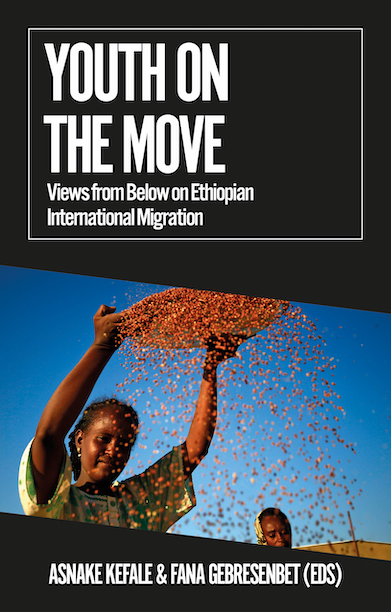 Youth on the Move:
Views from Below on Ethiopian International Migration
Youth on the Move:
Views from Below on Ethiopian International Migration
Asnake Kefale, Fana Gebresenbet
At a time when policies are increasingly against it, international migration has become the subject of
great public and academic attention. This book departs from the dominant approach of studying
international migration at macro level, and from the perspective of destination countries. The
contributors here seek to do more than ‘scratch the surface’ of the migration process, by foregrounding
the voices and views of Ethiopian youth–potential migrants and returnees–and of their sending
communities.
Published for the International African Institute by Hurst Publishers
ISBN: 9781787385702, 304pp, August 2021
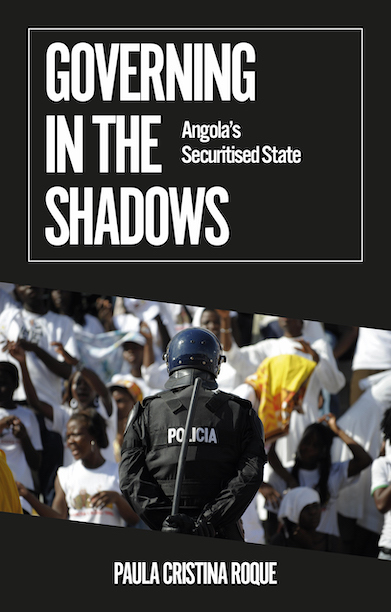 Governing in the Shadows:
Angola's Securitised State
Governing in the Shadows:
Angola's Securitised State
Paula Cristina Roque
This book traces three decades of securitisation in Angola. As a governing strategy during war and
peacetime, it muted the aspirations of those on opposing sides, distorted the state, emboldened elites
and redefined the identity of Angolans. Through this lens, Paula Cristina Roque provides an original
account of Angola’s post-conflict state-building.
Published for the International African Institute by Hurst Publishers
ISBN: 9781787385740, 264pp, August 2021
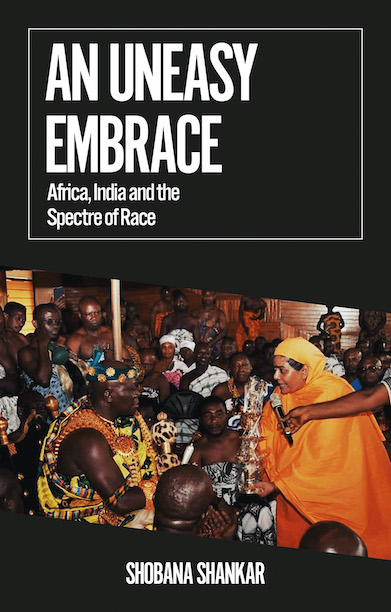 An Uneasy Embrace: Africa, India and the Spectre of
Race
An Uneasy Embrace: Africa, India and the Spectre of
Race
Shobana Shankar
The entwined histories of Blacks and Indians defy easy explanation. From Ghanaian protests over Gandhi
statues to American Vice President Kamala Harris’s story, this relationship—notwithstanding moments of
common struggle—seethes with conflicts that reveal how race reverberates throughout the modern
world.
Published for the International African Institute by Hurst Publishers
ISBN: 9781787385696 , 256pp, July 2021
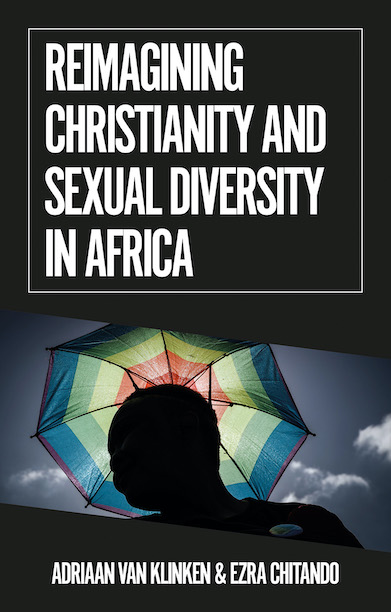 Reimagining Christianity and Sexual Diversity in Africa
Reimagining Christianity and Sexual Diversity in Africa
Ezra Chitando, Adriaan van Klinken
Religion is often seen as a conservative force in contemporary Africa. In particular, Christian beliefs
and actors are usually depicted as driving the opposition to homosexuality and LGBTI rights in African
societies. This book nuances that picture, by drawing attention to discourses emerging in Africa itself
that engage with religion, specifically Christianity, in progressive and innovative ways—in support of
sexual diversity and the quest for justice for LGBTI people
Published for the International African Institute by Hurst Publishers
ISBN: 9781787385719, 264pp, July 2021
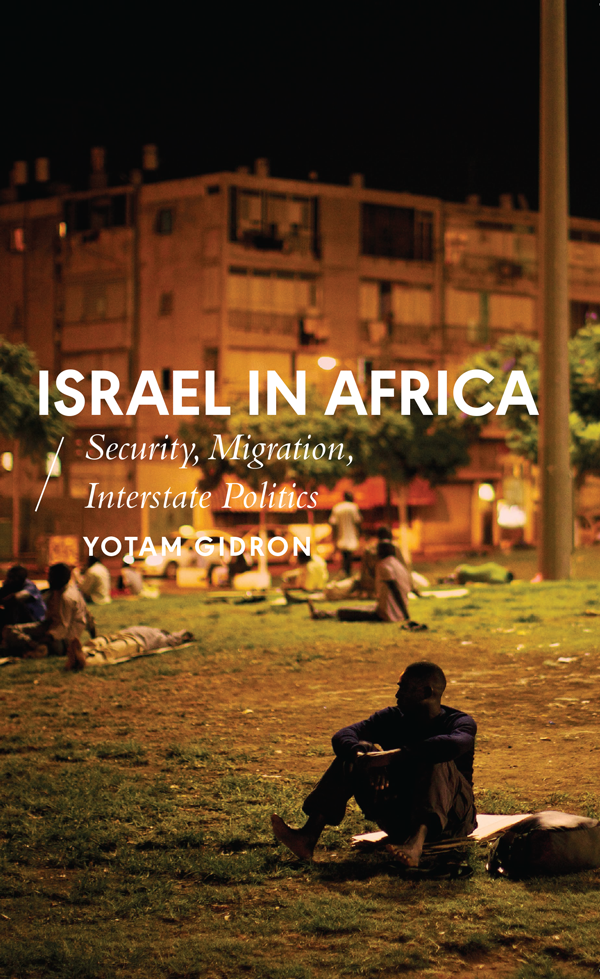 Israel in Africa: Security, Migration, Interstate
Politics
Israel in Africa: Security, Migration, Interstate
Politics
Yotam Gidron
Amidst the turmoil of the Middle East, few have noticed the extent to which Israel has slowly but surely
been building alliances on the African continent. Facing a growing international backlash, Israel has
had to look beyond its traditional Western allies for support, and many African governments in turn have
been happy to receive Israeli political support, security assistance, investments and technology. But
what do these relationships mean for Africa, and for wider geopolitics? From Africa’s authoritarian
development politics and the rise of Born-Again Christianity to Israel’s thriving high-tech and arms
industries, from the Israeli-Palestinian conflict to the migration of Africans to Israel and back again,
Gidron provides a comprehensive analysis of the various forces and actors shaping Israel’s controversial
relationships with countries on the continent. In particular, the book demonstrates that Israel’s
interest in Africa forms part of a wider diplomatic effort, aimed at blocking Palestine’s pursuit of
international recognition. Though the scale of Israeli-African engagements has been little appreciated
until now, the book reveals how contemporary African and Middle Eastern politics and societies interact
and impact each other in profound ways. Yotam Gidron is a researcher whose writing focuses on migration,
state-society relations, and popular culture in Africa and Israel/Palestine. He has worked with human
rights organisations in Israel and in East Africa, and is currently pursuing a PhD in African History at
Durham University.
Published for the International African Institute by Zed
Books
ISBN: 9781786995025, 192 pp, April 2020
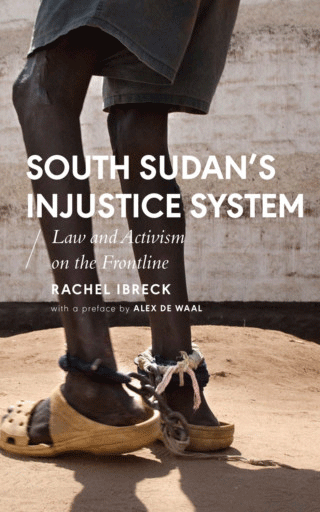 South Sudan’s Injustice System: Law and Activism on
the Frontline
South Sudan’s Injustice System: Law and Activism on
the Frontline
Rachel Ibreck
With a preface by Alex de Waal
Coming into existence amid a wave of optimism in 2011, South Sudan has since slid into violence and
conflict. Even in the face of escalating civil war, however, the people of the country continue to fight
for justice, despite a widespread culture of corruption and impunity. Drawing on extensive new research,
Rachel Ibreck examines people’s lived experiences as they navigate South Sudan’s fledgling justice
system, as well as the courageous efforts of lawyers, activists, and ordinary citizens to assert their
rights and hold the government to account.
In doing so, the author reveals how justice plays out in a variety of settings, from displacement camps
to chiefs’ courts, and in cases ranging from communal land disputes to the country’s turbulent peace
process. Based on a collaborative research project carried out with South Sudanese activists and legal
practitioners, the book also demonstrates the value of conducting researching with, rather than simply
about those affected by conflict. At heart, this is a people’s story of South Sudan - what works in this
troubled country is what people do for themselves.
Published for the International African Institute by Zed Books
ISBN: 9781786993397, 264pp, August 2019
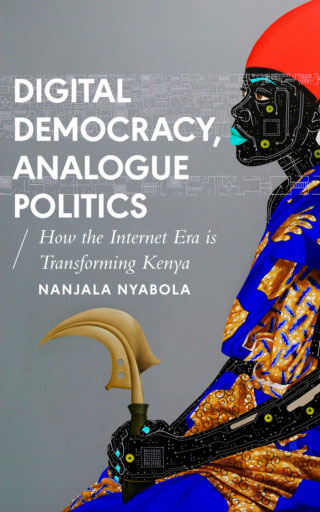 Digital Democracy, Analogue Politics: How the Internet Era is Transforming Kenya
Digital Democracy, Analogue Politics: How the Internet Era is Transforming Kenya
Nanjala Nyabola
From the upheavals of recent national elections to the success of the #MyDressMyChoice feminist movement, digital platforms have already had a dramatic impact on political life in Kenya – one of the most electronically advanced countries in sub-Saharan Africa. While the impact of the digital age on Western politics has been extensively debated, there is still little appreciation of how it has been felt in developing countries such as Kenya, where Twitter, Facebook, WhatsApp and other online platforms are increasingly a part of everyday life. Written by a respected Kenyan activist and researcher at the forefront of palitical online struggles, this book presents a unique contribution to the debate on digital democracy. For traditionally marginalised groups, particularly women and the disabled, digital spaces have allowed Kenyans to build new communities which transcend old ethnic and gender divisions. Digital Democracy, Analogue Politics explores the drastic efforts being made by elites to contain online activism, as well as how ‘fake news’, a failed digital vote-counting system and the incumbent president’s recruitment of Cambridge Analytica contributed to tensions around the 2017 elections. Reframing digital democracy from the African perspective, Nyabola’s ground-breaking work opens up new ways of understanding our current global online era.
ISBN: 9781786994318, 216pp, November 2018
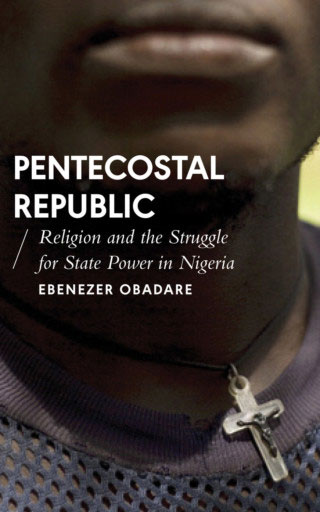 Pentecostal Republic: Religion and the Struggle for State Power in Nigeria
Pentecostal Republic: Religion and the Struggle for State Power in Nigeria
Ebenezer Obadare
Throughout its history, Nigeria has been plagued by religious divisions. Tensions have only intensified since the restoration of democracy in 1999, with the divide between Christian south and Muslim north playing a central role in the country’s electoral politics, as well as manifesting itself in the religious warfare waged by Boko Haram. Through the lens of Christian-Muslim struggles for supremacy, Ebenezer Obadare charts the turbulent course of democracy in the Nigerian Fourth Republic, exploring the key role religion has played in ordering society. He argues the rise of Pentecostalism is a force focused on appropriating state power, transforming the dynamics of the country and acting to demobilize civil society, further providing a trigger for Muslim revivalism. Covering events of recent decades to the election of Buhari, Pentecostal Republic shows that religio-political contestations have become integral to Nigeria’s democratic process, and are fundamental to understanding its future. Published for the IAI by Zed Books
ISBN: 9781786992376, 244pp, October 2018
 Taxing Africa: Coercion, Reform and Development
Taxing Africa: Coercion, Reform and Development
Mick Moore, Wilson Prichard, and Odd-Helge Fjeldstad
Taxation has been seen as the domain of charisma-free accountants, lawyers and number crunchers – an unlikely place to encounter big societal questions about democracy, equity or good governance. Yet it is exactly these issues that pervade conversations about taxation among policymakers, tax collectors, civil society activists, journalists and foreign aid donors in Africa today. Tax has become viewed as central to African development. Written by leading international experts, Taxing Africa offers a cutting-edge analysis on all aspects of the continent’s tax regime, displaying the crucial role such arrangements have on attempts to create social justice and push economic advancement. From tax evasion by multinational corporations and African elites to how ordinary people navigate complex webs of ‘informal’ local taxation, the book examines the potential for reform, and how space might be created for enabling locally led strategies.
Published for the IAI by Zed Books
ISBN: 9781783604531, 216pp, July 2018
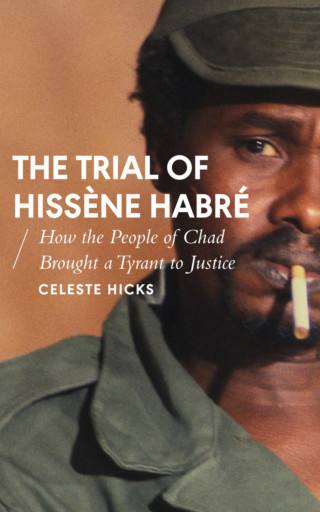 The Trial of Hissène Habré: How the People of Chad Brought a Tyrant to Justice
The Trial of Hissène Habré: How the People of Chad Brought a Tyrant to Justice
Celeste Hicks
When Hissène Habré, the deposed dictator of Chad, was found guilty of crimes against humanity in 2016, it was described as ‘a watershed for human rights justice in Africa and beyond’. For the first time, an African war criminal had been convicted on African soil. Having followed the trial from the very beginning and interviewed many of those involved, journalist Celeste Hicks tells the remarkable story of how Habré was brought to justice. His conviction followed a heroic 25 year campaign by activists and survivors of Habré’s atrocities, which succeeded despite international indifference, opposition from Habré’s allies, and several failed attempts to bring him to trial in Europe and elsewhere. In the face of such overwhelming odds, the conviction of a once untouchable tyrant represents a major turning point, with profound implications for African justice and the future of human rights activism globally.
Published for the IAI by Zed Books
ISBN: 9781786991836, 216pp, April 2018
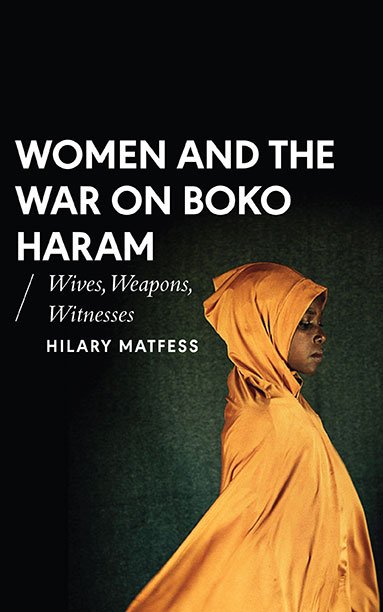 Women and the War on Boko Haram
Women and the War on Boko Haram
Hilary Matfess
For well over a decade, Boko Haram has waged a campaign of terror across northeastern Nigeria. In 2014, the group shocked the world when it abducted 276 girls en masse from a school in rural Chibok, and the resulting #BringBackOurGirls movement attracted support and solidarity from around the globe. Yet as Hilary Matfess shows, Boko Haram’s campaign of violence against women and girls goes far beyond the Chibok abductions. Having conducted extensive fieldwork throughout the region, Matfess provides a vivid and thought-provoking account of Boko Haram’s impact on the lives of Nigerian women.
Published for the IAI by Zed Books
ISBN: 9781786991454, 192pp, November 2017
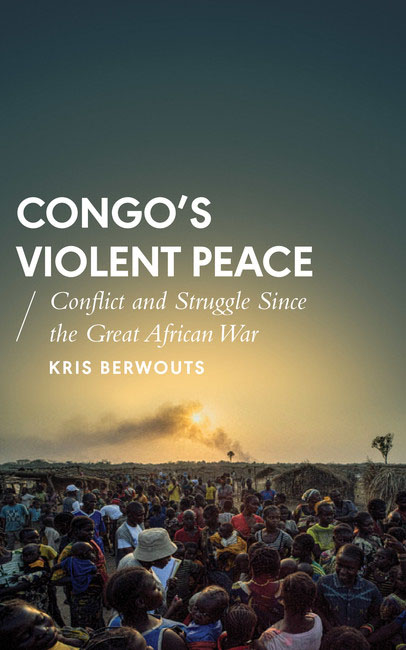 Congo's Violent Peace: Conflict and Struggle Since the Great African War
Congo's Violent Peace: Conflict and Struggle Since the Great African War
Kris Berwouts
Despite a massive investment of international diplomacy and money in recent years, the Democratic Republic of Congo remains a conflict-ridden and volatile country, its present situation the result of a series of rebellions, international interventions and unworkable peace agreements.
Leading DRC expert Kris Berwouts provides the most comprehensive and in-depth account to date of developments since the so-called 'Congo Wars' – from Rwanda's destructive impact on security in Eastern Congo to the controversial elections of 2006 and 2011; the M23 uprising to Joseph Kabila's increasingly desperate attempts to cling to power.
Published for the IAI by Zed Books
ISBN: 9781783603695, 256pp, July 2017
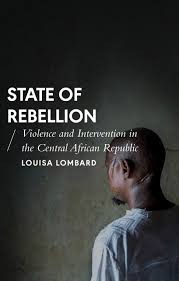 State of Rebellion: violence and intervention in the Central African Republic
State of Rebellion: violence and intervention in the Central African Republic
Louisa Lombard
In 2012, a wave of violence swept through the Central African Republic as Seleka rebels clashed with anti-Balaka militias. In the face of seemingly senseless bloodshed, journalists, politicians, and scholars struggled to account for the conflict’s origins. In this first comprehensive account of the violence, Louisa Lombard argues that the conflict was more than a straightforward religious clash between Christians and Muslims. Instead, she traces the roots of the conflict to fears of spiritual insecurity and a social breakdown that drove inter-communal violence.
Placing the uprising within its broader social, cultural, and historical context , Lombard reveals the complicated roles played by marginalized rural youths, local political leaders, and the global community in sustaining the conflict, and she offers an urgent corrective to our perceptions of this little-understood country, making a compelling case for international leaders to rethink their approach to resolving the conflict.
Published for the IAI by Zed Books
ISBN: 9781783608843, 300pp, November 2016
 Ebola: how a people's science helped end an African epidemic
Ebola: how a people's science helped end an African epidemic
Paul Richards
From December 2013, the largest Ebola outbreak in history swept across West Africa, claiming thousands of lives in Liberia, Sierra Leone and Guinea. By the middle of 2014, the international community was gripped by hysteria. Experts grimly predicted that millions would be infected within months, and a huge international control effort was mounted to contain the virus. Yet paradoxically, by this point the disease was already going into decline in Africa itself. So why did outside observers get it so wrong? Paul Richards draws on his extensive fieldwork in Sierra Leone to argue that the international community’s panicky response failed to take account of local expertise and common sense. Crucially, Richards shows that the humanitarian response to the disease was most effective in those areas where it supported these initiatives – such as giving local people agency in terms of disposing of bodies – and actually hampered recovery when it ignored or disregarded local knowledge. An essential account of what actually occurred during the Ebola outbreak, and its implications for harnessing the power of local communities for future humanitarian health crises.
Paul Richards is an anthropologist with over forty-five years’ experience of living and working in West Africa, having conducted fieldwork in Nigeria, Liberia, and Sierra Leone. He is emeritus professor of technology and agrarian development at Wageningen University. His previous books include No Peace, No War and Fighting for the Rainforest.
'Read Chapter 3 and Chapter 6 of Paul Richards book
translated into French.The translations were prepared by Elfi Kashori Martial (Goma, DRC) and
are published with permission of the Author and International African Institute. The chapters
published on this site are licensed under a Creative
Commons Attribution-NonCommercial-NoDerivs 3.0 Unported License.
Published for the IAI by Zed Books
ISBN: 9781783608584, 256 pp, September 2016
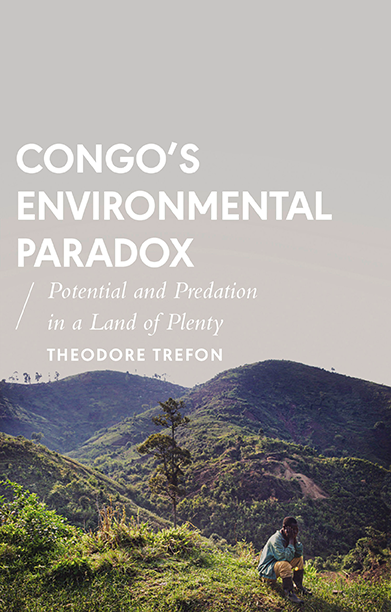 Congo's Environmental Paradox: potential and predation in a land of plenty
Congo's Environmental Paradox: potential and predation in a land of plenty
Theodore Trefon
Congo has the natural resources the world needs. Its forests count in the fight against global climate change and its mining sector helps satisfy our addiction to the latest high tech gadgets. Congo’s farmers could feed all of Africa’s population of over a billion people. The Inga hydroelectric site has the potential to light up the entire continent. These realities are redefining the country’s strategic place in a globalized world. Telling a different story about power and nature, Congo’s Environmental Paradox examines the dynamics of this huge country’s forest, mining, land, water and oil sectors in an integrated way. It connects the dots by emphasizing resource diversity, interlinkages and the complex nature of these sectors. Congo’s incredible natural wealth has the potential to contribute to development in this troubled central African country – but structural problems, cultural factors, poor governance and predation remain serious challenges. Clearly written, full of environmental facts and analyses, this volume is a must-read for anyone interested in development and the political economy of natural resource management in Africa.
An invaluable contribution – a truly remarkable synthesis of the pathways to Congolese economic improvement and the many roadblocks along the way. The succinct and sparkling summation of the key elements of the political economy is most useful. The author's capacity to convey a rich treasure chest of information and acute analytical skills make this a landmark work. – Crawford Young, University of Wisconsin
Published for the IAI by Zed Books.
ISBN: 9781783602438, 176 pp, May 2016
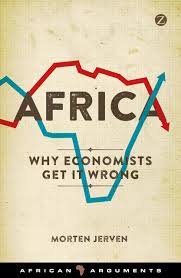 Africa: why economists get it wrong
Africa: why economists get it wrong
Morten Jerven
Morten Jerven seeks to fundamentally reframe the debate around African economics, challenging mainstream accounts. Whilst for the past two decades experts have focused on explaining why there has been a ‘chronic failure of growth’ in Africa, Jerven shows that African economies grew rapidly in the 50s, the 1960s, and even into the 1970s. And most African economies have been growing at a rapid pace since the mid-90s. Therefore African states were dismissed as incapable of development based largely on observations made during the 1980s and early 1990s. The result has been misguided analysis and policy.
Published for the IAI by Zed Books
ISBN: 9781783601325, 176pp, June 2015
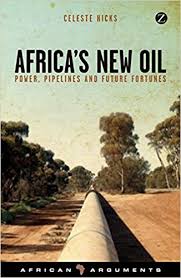 Africa’s New Oil: power, pipelines and future fortune
Africa’s New Oil: power, pipelines and future fortune
Celeste Hicks
In recent years, technological advances, higher commodity prices and an insatiable global thirst for energy have meant that African oil is increasingly in demand. Countries as far apart as Niger, Uganda, Chad, Ghana and Kenya are looking at the prospect of almost unimaginable flows of money into their national budgets.
But the story of African oil has usually been associated with conflict, corruption and disaster, with older producers such as Nigeria, Angola and Cameroon having little to show for the many billions of dollars they've earned. In this eye-opening book, former BBC correspondent Celeste Hicks questions the inevitability of the so-called 'resource curse', revealing what the discovery of oil means for ordinary Africans, and how China's involvement threatens a profound change in Africa's relationship with the West.
Published for the IAI by Zed Books
ISBN: 9781783601127, 224pp, April 2015
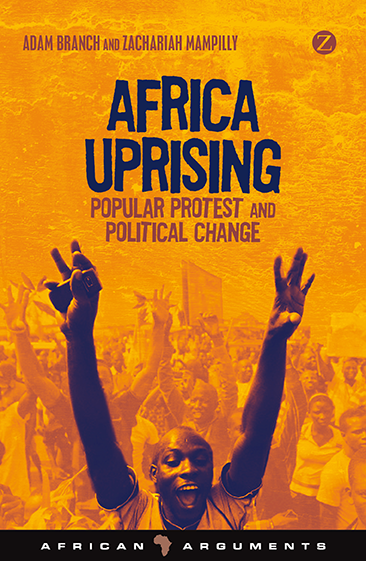 Africa Uprising: popular protest and political change
Africa Uprising: popular protest and political change
Adam Branch and Zachariah Mampilly
From Tunisia and Egypt, to Uganda and Sudan, to Nigeria and Senegal, African cities have seen uprisings by youth and unemployed, as well as by organized labour, civil society activists, writers and artists, and religious groups.
Drawing on interviews and in-depth analysis from Nigeria, Uganda, Sudan and Ethiopia, Branch and Mampilly explore what is driving this new wave of popular protest in Africa, situating the current popular activism within its broader historical and continental context. Melding analyses of Africa's incorporation into the global economy, the failure of African governments to truly democratize, the actions of opposition forces both formal and informal, and the role of African popular culture, the authors provide insight into understanding African politics today.
Published for the IAI by Zed Books
ISBN: 9781780329970, 272pp, March 2015
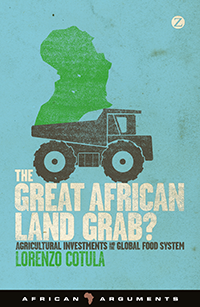 The Great African Land Grab? Agricultural Investment and the Global Food System
The Great African Land Grab? Agricultural Investment and the Global Food System
Lorenzo Cotula
Large-scale land acquisitions in Africa have stoked controversy, making headlines in media reports across the world. Dubbed ‘land grabs’, these have become one of the most talked about and contentious topics amongst those studying, working in or writing about Africa. Some commentators have welcomed the trend as a bearer of new livelihood opportunities while others have pointed to negative social impacts, including loss of local land rights, threats to local food security, and marginalisation of small-scale farming. Lorenzo Cotula, one of the leading experts in the field, casts a critical eye over the most reliable evidence available on this hotly contested topic, examining the implications of land deals in Africa for its people, for world agriculture and food.
ISBN: 9781780324203 256pp. July 2013
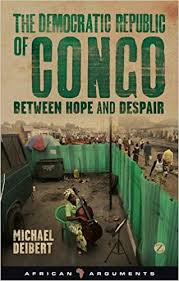 Democratic Republic of Congo: Between Hope and Despair
Democratic Republic of Congo: Between Hope and Despair
Michael Deibert
Over the past decade and a half, the Democratic Republic of Congo has been at the centre of the deadliest series of conflicts since the Second World War, and now hosts the largest United Nations peacekeeping mission in the world. Featuring a wealth of remarkable on-the-ground reportage and first-hand interviews acclaimed journalist Michael Deibert paints a compelling picture of a nation in flux, inching towards peace but solidifying into what may prove to be another era of authoritarian rule.
ISBN 9781780323459 176pp. December 2013
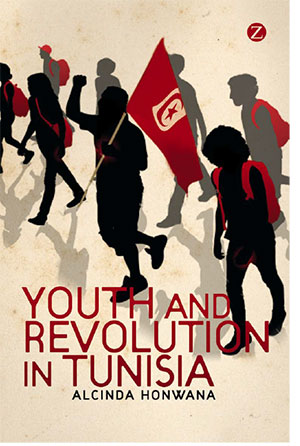 Youth and Revolution in Tunisia
Youth and Revolution in Tunisia
Alcinda Honwana
The uprising in Tunisia in late 2010 and early 2011 kick-started the series of upheavals across the region now known as the Arab Spring. In this remarkable work, Alcinda Honwana, who was herself in Tunisia at the time of the revolution, goes beyond superficial accounts of what occurred to explore the defining role of the country's youth. Drawing on fresh, first-person testimony from those who shaped events, the book describes in detail the experiences of young activists through the 29 days of the revolution and the challenges they encountered after the fall of the regime and the dismantling of the ruling party.
ISBN 978-1780324616 160pp. July 2013
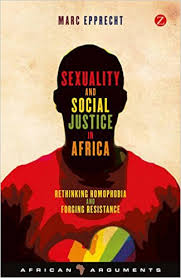 Sexuality and Social Justice in Africa
Sexuality and Social Justice in Africa
Marc Epprecht
The persecution of people in Africa on the basis of their assumed or perceived homosexual orientation has received considerable coverage in the popular media in recent years. Gay-bashing by high political and religious figures in Zimbabwe and Gambia; draconian new laws against lesbians and gays and their supporters in Malawi, Nigeria, Uganda; the imprisonment and extortion of gay men in Senegal and Cameroon; and so-called corrective rapes of lesbians in South Africa have all rightly sparked international condemnation. However, much of the analysis thus far has been highly critical of African leadership and culture without considering local nuances, historical factors and external influences that are contributing to the problem. Such commentary also overlooks grounds for optimism and the role played by lgbti and HIV/AIDS activism in the struggle for sexual rights and justice in Africa, not just for sexual minorities but for the majority population as well.
Marc Epprecht is a Professor in the Department of Global Development Studies at Queen's University, Canada.
Published for the IAI by Zed Books.
ISBN 9781780323817 208pp. June 2013
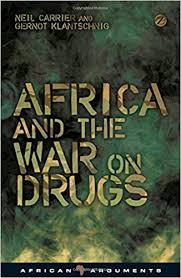 Africa and the War on Drugs
Africa and the War on Drugs
Neil Carrier and Gernot Klantschnig
Nigerian drug lords, khat-chewing Somali pirates, crystal meth-smoking gangs controlling South Africa’s streets and narco-traffickers corrupting Guinea-Bissau: these are some of the vivid images surrounding drugs in Africa which in recent years have alarmed policymakers, academics and the general public. In this revealing and original book on an overlooked front of the so-called war on drugs, the authors show how foreign-inspired policies have failed to help African drug users who require medical support while strengthening corrupt and brutal law enforcement officers.
…offers a devastating challenge to the war on drugs and its apologists. – Jonny Steinberg
Neil Carrier is a researcher at the University of Bristol.
Gernot Klantshnig is Assistant Professor in International Studies at the University of Nottingham, Ningbo, China.
Published for the IAI by Zed Books.
ISBN 9781848139664 186pp. October 2012
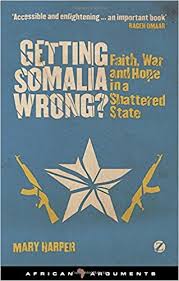 Getting Somalia Wrong? Faith, War and Hope in a Shattered State
Getting Somalia Wrong? Faith, War and Hope in a Shattered State
Mary Harper
Somalia is a comprehensively failed state, representing a threat to itself, its neighbours and the wider world. In recent years, it has become notorious for the piracy off its coast and the rise of Islamic extremism, opening it up as a new 'Southern front' in the war on terror. At least that is how it is inevitably presented by politicians and in the media. Mary Harper argues however that viewing Somalia through the prism of al-Qaeda risks further destabilizing the country and the entire Horn of Africa, She also shows that Somalia is far from being a failed society: in reality, alternative forms of business, justice, education and local politics have survived and even flourished.
The most accessible and accurate account available of the contemporary Somali world, pirates and all. – Ioan Lewis
Read a series of reviews commissioned by the World Peace Foundation.
Mary Harper is Africa Editor for BBC World Service News.
Published for the IAI by Zed Books.
ISBN 978-1842779330, 139 pp, February 2012
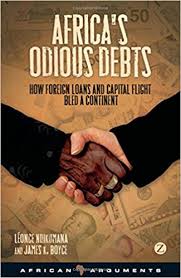 Africa's Odious Debts: How Foreign Loans and Capital Flight Bled a Continent
Africa's Odious Debts: How Foreign Loans and Capital Flight Bled a Continent
Leonce Ndikumana and James Boyce
The extent of capital flight from sub-Saharan Africa is remarkable: more than $700 billion in the past four decades. But Africa s foreign assets remain private and hidden, while its foreign debts are public, owed by the people of Africa through their governments. This book reveals the intimate links between foreign loans and capital flight. More than half of the money borrowed by African governments in recent decades departed in the same year, with a significant portion of it winding up in private accounts at the very banks that provided the loans in the first place. Meanwhile, debt-service payments continue to drain scarce resources from Africa, cutting into funds available for public health and other needs. The authors argue that African governments should repudiate these odious debts from which their people derived no benefit, and that the international community should assist in this effort.
James K. Boyce and Leonce Ndikumana are both professors of economics at the University of Massachusetts, Amherst.
Published for the IAI by Zed Books.
ISBN 9781848134591 160pp, October 2011
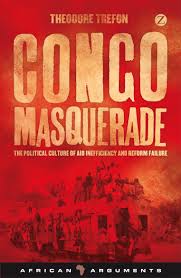 Congo Masquerade. The Political Culture of Aid Inefficiency and Reform Failure
Congo Masquerade. The Political Culture of Aid Inefficiency and Reform Failure
Theodore Trefon
Congo Masquerade is about mismanagement, hypocrisy and powerlessness in what has proved to be one of Africa's most troublesome and volatile states. In this scathing study of catastrophic aid inefficiency, Trefon argues that whilst others have examined war and plunder in the Great Lakes region, none have yet evaluated the imported 'template format' reform package pieced together to introduce democracy and improve the well-being of ordinary Congolese. It has, the book demonstrates, been for years an almost unmitigated failure due to the ingrained political culture of corruption amongst the Congolese elite, abetted by the complicity and incompetence of international partners.
Theodore Trefon is a Congo expert specializing in the politics of state-society relations. He heads the Contemporary History Section of the Belgian Royal Museum for Central Africa.
Published for the IAI by Zed Books.
ISBN: 9781848138360, 160pp, September 2011
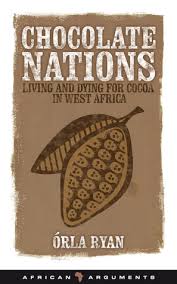 Chocolate Nations: Living and Dying for Cocoa in West Africa
Chocolate Nations: Living and Dying for Cocoa in West Africa
Orla Ryan
Chocolate is one of the world's most everyday luxuries, yet the story behind the chocolate bar is rarely one of luxury. The crop provides a lifeline for millions of farmers in West Africa, which produces about 70% of the world's cocoa and is crucial to the economies of Ghana and Côte d’Ivoire. Chocolate Nations examines the causes of farmer poverty, placing the story of these producers in the context of the commodity producers' global battle to make more money from their crops. Includes accounts from cocoa farmers and chocolate industry insiders, and addresses such crucial issues as child labour, speculation and the ineffectiveness of Fair Trade as a catch-all solution.
Read a review of this book published in the Guardian here.
Orla Ryan is a freelance journalist based in London. She previously worked for the BBC, and as a journalist in Africa. In recent years she worked for Reuters in Ghana, where she covered the West African cocoa sector.
ISBN: 9781848130050, 200pp, Jan 2011
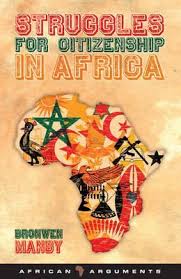 Struggles for Citizenship in Africa
Struggles for Citizenship in Africa
Bronwen Manby
Hundreds of thousands of people living in Africa find themselves non-citizens in the only state they have ever known. Ultimately such policies can lead to economic and political disaster, and war. This book brings together new material from across Africa of the most egregious examples of citizenship discrimination, and makes the case for urgent reform of the law.
Ever more people in Africa are excluded from citizenship through a complex intertwinement of colonial categorizations and post-colonial political tricks, coupled with mounting xenophobia… Bronwen Manby and her team offer a deeper understanding of the complex backgrounds and striking variations involved, vividly evoking the plights of millions who have to do without any state protection. A most convincing testimony to the urgency of this issue. – Peter Geschiere.
Bronwen Manby worked with the Africa Governance Monitoring and Advocacy Project (AfriMAP), an initiative of the Open Society Institute network's four African foundations.
9781848133525, 208pp. Aug 2009
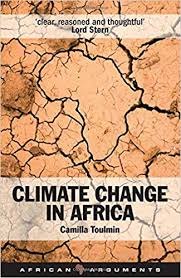 Climate Change in Africa
Climate Change in Africa
Camilla Toulmin
Global warming above the level of two degrees Celsius would be enormously damaging for poorer parts of the world, leading to crises with crops, livestock, water supplies and coastal areas. Within Africa, it is likely to be the continent's poorest people who are hit hardest. In this accessible and authoritative introduction to an often-overlooked aspect of the environment, Camilla Toulmin uses case studies to look at issues ranging from natural disasters to biofuels, and from conflict to the oil industry. Finally, the book addresses what future there might be for Africa in a carbon-constrained world.
Camilla Toulmin was formerly Director of the International Institute for Environment & Development.
ISBN 9781848130159 c.160pp. Sept 2009
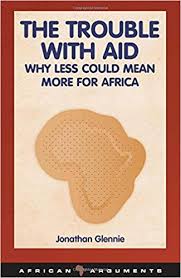 The Trouble with Aid. Why Less Could Mean More for Africa
The Trouble with Aid. Why Less Could Mean More for Africa
Jonathan Glennie
Jonathan Glennie's excellent and immensely readable book presents a compelling case not to demand ever more aid, but rather to seek the more fundamental changes in the global economy which could reduce dependency on aid and contribute to the ultimate eradication of poverty.
'At last a book that speaks frankly to the fundamentals of aid and how it is delivered. Ignore this book at your peril; this is an issue we cannot relegate to the sidelines of development.' - Charles Mutasa, Director, Africa Forum and Network on Development and Debt (AFRODAD)
ISBN 978184813040 c.200pp. Nov 2008
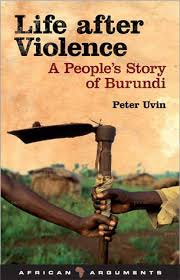 Life after Violence. A People’s Story of Burundi
Life after Violence. A People’s Story of Burundi
Peter Uvin
Burundi emerged from twelve years of devastating civil war with its economy destroyed and hundreds and thousands of people killed. In this book, the voices of ordinary Burundians are heard for the first time. Farmers, artisans, traders, mothers, soldiers and students talk about the past and the future, war and peace, their hopes for a better life and their relationships with each other and the state. Young men, in particular, often seen as the cause of violence and war, talk about the difficulties of living up to standards of masculinity in an impoverished and war-torn society.
The author pitches the ideas and aspirations of people on the ground against the theory and assumptions often made by the international development and peace-building agencies and organizations. Both shared goals and misunderstandings are revealed, opening perspectives on conflict, society and development in Africa and across the world.
Read a review of this book in the Washington Post
Peter Uvin is the Henry J. Leir Professor of International Humanitarian Studies and Academic Dean at the Fletcher School, Tufts University.
ISBN 9781848131804, c.200pp. Nov 2008
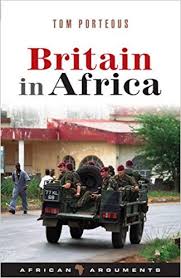 Britain in Africa
Britain in Africa
Tom Porteous
This book seeks to answer questions about Britain’s role in Africa and the policies of the Labour government since 1997. It considers the interests the UK is seeking to uphold, the impact of the tripling of aid to Africa in the shadows of the ‘war on terror’ and the war in Iraq.
'This is the most helpful and illuminating book on a Western country's foreign policy in Africa for a very long time. Porteous takes us behind the scenes into the policy world itself. Rarely have such intricacies been conveyed so compellingly.' – Jane Guyer, Johns Hopkins University
Tom Porteous is the London Director of Human Rights Watch.
ISBN 9781842779767, 158pp. 2008
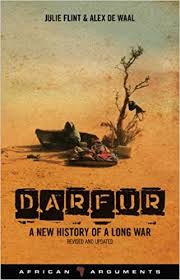 Darfur. A New History of a Long War
Darfur. A New History of a Long War
Julie Flint and Alex de Waal
Two authors with unparalleled experience of Darfur investigate a complex and fascinating story of a remarkable and remote region of Africa, and its war of hideous proportions, which the United Nations has deemed ‘the world’s worst humanitarian crisis’. The book details the history of Darfur, its conflicts, and the designs on the region by the governments in Khartoum and Tripoli, the infamous ‘Janjawid’ militia, the nature of the insurrection launched by two rebel groups, the radical Sudan Liberation Army and the more Islamist-oriented Justics and Equity Movement. It charts the unfolding crisis and the confused international response, including the African Union’s first major venture into peacemaking and peacekeeping, outlining what the future may hold for the region.
'This is among the best works available on the current Darfur crisis. For a blow by blow account of developments, there is none better.' – Mahmood Mamdani, University of Columbia
ISBN 9781842779507, 336pp. May 2008
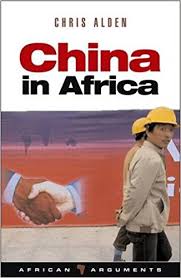 China in Africa
China in Africa
Chris Alden
This book investigates the emerging relationship between China and Africa. Alden argues that in order to understand Chinese involvement on the continent, we need to recognize the range of economic, diplomatic and security rationales behind Beijing’s Africa policy, as well as the response of African elites to China’s entreaties.
‘In this elegant and engaging study, Chris Alden brings together the key pieces that define the complex mosaic of China's recent engagement in Africa. Analytically sophisticated and drawing on an impressive vein of evidence, this book must be welcomed both as an illuminating account and for its measured judgment.' - Garth le Pere, Institute for Global Dialogue, South Africa
Chris Alden is in the Department of International Relations at the London School of Economics.
ISBN 9781842778647, 154pp. 2007
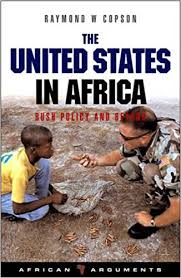 The United States in Africa. Bush Policy and Beyond
The United States in Africa. Bush Policy and Beyond
Raymond W. Copson
This book contests the rhetorical claims of the US administration that it is bringing peace, democracy and development to Africa, arguing that US policy falls well short of meeting standards of fairness and justice.
‘…cogently and succinctly dissects US President George W. Bush's array of policy initiatives toward Africa from 2001 to early 2007. One by one, the initiatives come under the knife and are cut to pieces…a great pleasure to read.’ – African Affairs
Raymond Copson is an independent scholar specializing in African affairs and US-Africa relations.
ISBN 9781842779156, 170pp. 2007
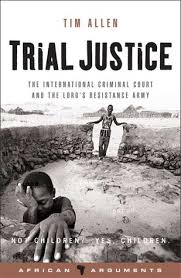 Trial Justice. The International Criminal Court and the Lord's Resistance Army
Trial Justice. The International Criminal Court and the Lord's Resistance Army
Tim Allen
Drawing on field research in Uganda, this book illustrates how the International Criminal Court ran into serious problems with its first big case on northern Uganda. The ICC has confronted outright hostility from a wide range of groups, including traditional leaders, representatives of the Catholic and Anglican Churches, and non-governmental organizations. For many, the Court is spoiling the peace process and is making continued warfare and suffering more likely. This book argues that much of the antipathy to the ICC is based upon ignorance and misconception. It shows that victims are much more interested in punitive international justice than has been suggested.
‘A seminal work that carefully evaluates the conflict that has raged in the region for nearly twenty years. Allen is an anthropologist...who has been working in Northern Uganda for some time. His work, therefore, is of significant value. He is one of a handful of authors...whose writing is supported by a deep knowledge and clear understanding of both the social complexities and the political realities of the region.' – Joanna Quinn, Transitional Justice Forum
ISBN 9781842777374, 176pp. 2006
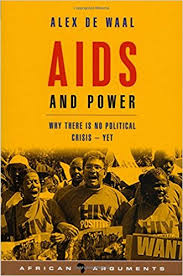 Aids and Power. Why there is no political crisis - yet
Aids and Power. Why there is no political crisis - yet
Alex de Waal
The HIV/AIDS crisis is a stunning cataclysm, plunging life expectancy to pre-modern levels and orphaning millions of children. Yet political trauma does not grip Africa. People living with AIDS are not rioting in the streets or overthrowing governments. In fact, democratic governance is spreading. AIDS and Power explains how political leaders have successfully managed the AIDS epidemic so as to overcome any threats to their power. Partly because of pervasive denial, AIDS is not a political priority for electorates, and therefore not for democratic leaders either.
Meantime, AIDS activists have not directly challenged the political order, instead using international networks to promote a rights-based approach to tackling the epidemic.
In contrast, both African governments and international agencies have a sorry record of tackling the epidemic and public health crisis itself. The study concludes that without political incentives, this failure will persist.
ISBN 9781842777077, 147pp. 2006
